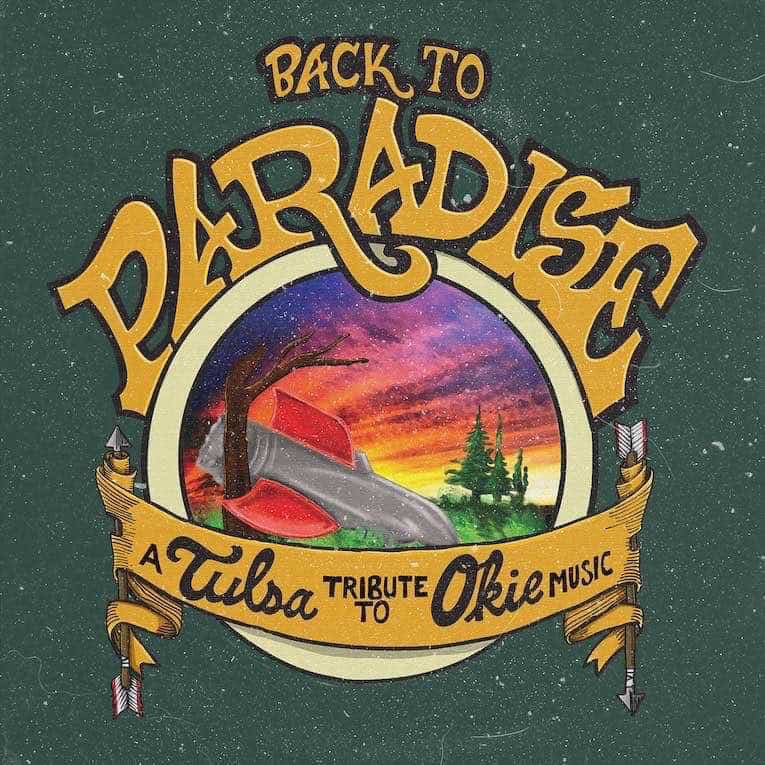
Back To Paradise: A Tulsa Tribute To Okie Music
By Chris Wheatley
Released this August 28th via Horton Records, ‘Back To Paradise: A Tulsa Tribute To Okie Music’ is a project to be savoured. In February of 2020, a group of 20 notable Tulsa musicians travelled to Leon Russell’s famed Paradise Studio at Grand Lake to record the first album tracked there since 1978. The core group includes guitarist Paul Benjaman (former student of the great Junior Brown and collaborator with Steve Earle and Kris Kristofferson), multi-instrumentalist Jesse Aycock, Grammy nominee John Fullbright, drummer Paddy Ryan, and Aaron Boehler, whose driving bass underpins the whole.
To pay homage to the often-overlooked ‘Tulsa sound,’ the assembled players chose seventeen tracks by past Tulsa greats and spent four days laying down their own versions, mostly live with very few over-dubs. Works by Leon Russell, J.J. Cale, The Gap Band, Jesse Ed Davis, Steve Ripley and Don White all get a look-in.
The songs presented here have a warm, intimate feel, very much reminiscent of the era which they seek to celebrate, and are produced by Jason Weinheimer and Them Tulsa Boys. John Fullbright’s choice is Steve Ripley’s “Crossing Over,” which, with its biblical allusions, swirling organ and gritty pathos, is a fitting opener for the album. It carries the emotional power coupled with steel-wrapped-in-silk delivery of late-60s Elvis Presley. Singer-songwriter Branjae lets loose on Lowell Fulson’s “Tramp,” infusing it with a suitable amount of swagger and sweat as the backing players stir up deep funky rolling rhythms and twangy guitar. There’s a palpable atmosphere of good vibes spilling out of these songs. It is clear that all involved were delighted to take part.
At the heart of this record lies the Paradise Studio at Grand Lake. During the 60s and 70s, this famed building hosted a who’s who of music’s most talented, including Bob Dylan, Bob Seger, JJ Cale, Freddie King and the Gap Band. This self-contained compound, set on an idyllic peninsula, clearly inspired the modern-day players. As John Fullbright states, “One of the coolest things about driving there was thinking that Bob Dylan did the exact same drive, George Harrison did the exact same drive.” It has long been an axiom in the industry that setting plays a vitally important role in the creative process. Musicians will tell you that it’s not just the engineers and the equipment–it’s the feel of a studio that has the power to energize or to stifle.
Jesse Aycock says, “Historically, players from this part of Oklahoma seem to have a different approach to music, the same way that Muscle Shoals, Memphis Chicago, Detroit, Austin and Nashville are known for having a sound. I think Leon and J.J. tapped into a unique pulse in this area and I would like to think that it’s still vibrating today.”
On this record, the latter is clearly the case. Original Tulsa-sound innovator Don White’s “Helluva Deal” is treated to a loving make-over that bounces out of the speakers. Laced with wry good humour and a down-home, devil-may-care attitude, coupled with smoking guitar and shuffling rhythms, it’s as good a blueprint for the genre as you could ask for. The spikier “Black Cherry” (originally a hit for Junior Markham) is a highlight. Beautifully produced, with dual-attack guitars, storming drums and floating vocals, this track nevertheless retains the down-to-earth warmth and sense of human connection which runs throughout the set.
With ‘Back to Paradise: A Tulsa Tribute To Okie Music’, the assembled musicians have pulled off a rarity. This is a tribute album which feels far weightier than the usual bland offerings which often make up such projects. It is also an album created by a musical collective that sounds remarkably consistent and spontaneous. John Fullbright et al have managed to cover a lot of ground here, mapping out a significant portion of music history with clarity, precision and, most importantly, reverence. They have created not just a wonderful celebration of the original Tulsa sound, but a record which more than stands up on its own.

Leave A Comment